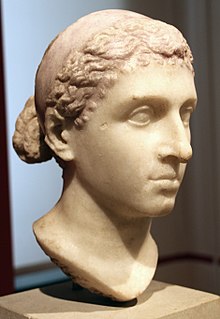 W
WWomen of African descent have always been active in Christianity since the very early days of this religion. African-American women mainly worship in traditionally black Protestant churches, with 62% identifying themselves as historically black Protestants. Many hold leadership positions in these churches and some lead congregations, especially in the American deep south. Black women also have served as nuns in the Catholic Church in the United States since the early 19th Century.
 W
WSince antiquity, biblical ethnonyms, as seen for example in the Table of Nations in Genesis 10, have been used as a basis for classifying human racial and national identities.
 W
WBorealism is a form of exoticism in which stereotypes are imposed on the Earth's northern regions and cultures.
 W
WThe race of Cleopatra VII, the last active Hellenistic ruler of the Macedonian-led Ptolemaic Kingdom of Egypt, has caused some debate in scholarly and non-scholarly circles. For example, the article "Was Cleopatra Black?" was published in Ebony magazine in 2002. Mary Lefkowitz, Professor Emerita of Classical Studies at Wellesley College, traces the origins of the Black Cleopatra claim to the 1946 book by J.A. Rogers called "World's Great Men of Color." Lefkowitz refutes Rogers' hypothesis, on various scholarly grounds. The black Cleopatra claim was further revived in an essay by afrocentrist John Henrik Clarke, chair of African history at Hunter College, entitled "African Warrior Queens." Lefkowitz notes the essay includes the claim that Cleopatra described herself as black in the New Testament's Book of Acts – when in fact Cleopatra had died more than sixty years before the death of Jesus Christ.
 W
WCoyote, , is a derogatory colonial Spanish American racial term for a mixed-race person casta, usually referring to a person born of parents one of whom is a Mestizo and the other indigenous (indio).
 W
WThe feminist philosophy journal Hypatia became involved in a dispute in April 2017 that led to the online shaming of one of its authors, Rebecca Tuvel, a tenure-track assistant professor of philosophy at Rhodes College in Memphis. The journal had published a peer-reviewed article by Tuvel in which she compared the situation of Caitlyn Jenner, a trans woman, to that of Rachel Dolezal, a white woman who identifies as black. When the article was criticized on social media, scholars associated with Hypatia joined in the criticism and urged the journal to retract it. The controversy exposed a rift within the journal's editorial team and more broadly within feminism and academic philosophy.
 W
WJerome Krase is Professor Emeritus of Sociology and Murray Koppelman. Professor at School of Humanities and Social Sciences. President of European Academy of Sciences of Ukraine.
 W
WThe multiregional hypothesis, multiregional evolution (MRE), or polycentric hypothesis is a scientific model that provides an alternative explanation to the more widely accepted "Out of Africa" model of monogenesis for the pattern of human evolution.
 W
WMany countries and national censuses currently enumerate or have previously enumerated their populations by race, ethnicity, nationality, or a combination of these characteristics. Different countries have different classifications and census options for race and ethnicity/nationality which are not comparable with data from other countries. In addition, many of the race and ethnicity concepts that appear on national censuses worldwide have their origins in Europe or in the views of Europeans, rather than in the views of the locals of these countries.
 W
WThe Race Question is the first of four UNESCO statements about issues of race. It was issued on 18 July 1950 following World War II and Nazi racism to clarify what was scientifically known about race, and as a moral condemnation of racism. It was criticized on several grounds and revised versions were publicized in 1951, 1967, and 1978.
 W
WTrans: Gender and Race in an Age of Unsettled Identities by American sociologist Rogers Brubaker is an analysis of racial and gender identity, published by Princeton University Press in 2016 in the wake of the publicity around Caitlyn Jenner and Rachel Dolezal.
 W
WTransracial people identify as a different race than the one associated with their ancestry.